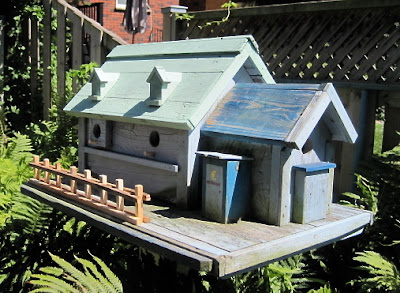["Soldiers pour out of landing barges. Note ladders used to
help scale obstacles": Feb. 5, 1944, London Free Press]
On February 5, 1944 a headline in The London Free Press read as follows: Norwich Boys In Thick of Two Invasions By Allies. The sub-heading said: LS. Buryl McIntyre and LS. Douglas Harrison With "Biggest Armada of All Time". Rare it is that my hometown hits the headlines. Rarer still that my father and his good friend would be in the spotlight.
["Buryl McIntyre (left) and Doug Harrison, Norwich, Ontario"]
But the war was on - e.g., in Sicily, 70 years ago this month - and fresh news kept coming back to Canada as men returned on leave before suiting up and finding fresh assignments. The article was comprehensive and in it I find first hand details of how my father and his 'oppo' fared in Sicily after the July 10, 1943 D - Day or invasion of the island, a stepping stone to Italy. (Re 'oppo': a term used by Navy men to describe those working opposite one another, e.g., upon a landing craft. One might work the motors while the other worked the winches.)
[http://en.wikipedia.org/wiki/Corned_beef]
One paragraph in the newspaper article - about some daily cooking routines - matches up very closely with stories my father tells in his naval memoirs (penned in 1975 while living in Norwich) about his time in Sicily, so I attribute many of the following details to him:
"After the fall of Sicily the boys landed and set up house-
keeping. They were then able to get fresh fruit such as
grapes, lemons and limes as well as fresh tomatoes. There
was plenty of firewood and they did their cooking in biscuit
tins. Aboard the barges they had used these tins as stoves,
partially filling them with sand or cotton waste, pouring
gasoline, sometimes mixed with oil, punching holes in the
sides of the can around the top to provide air while cooking
and stirring well before lighting. Such a fire would burn for
a long time and could be given new life by adding a little
fuel and stirring. They had been given rations aboard
the barges but had to do their own cooking and make
their own tea." [The London Free Press, 1944]
For those wishing to know what the rations were like, you won't find the answer anywhere within the full Free Press interview with Buryl and Doug. By early 1944 both men would likely admit they did not want to see another tin of rations for as long as they lived. The following old photo and details may help explain why.
["Soldiers in Tripoli share a tin of bully beef": nzetc.victoria.ac.nz']
important as a food source during World War II.
Much of the canned corned beef came from Fray
Bentos in Uruguay, with over 16 million cans
exported in 1943.
[http://en.wikipedia.org/wiki/Corned_beef]
Bully beef (i.e., corned beef) made up a significant part of Navy rations. Of the 16 million tins exported from Uruguay in 1943, my father would likely say he unloaded almost all of them. In his memoirs (1975) he says the following:
"I had 27 days at Sicily living on tomatoes and Bully Beef.
I swore I would kick the first bull I saw in Canada right
in the posterior if I got back." [Page 33, "DAD, WELL DONE"]
["Bully Beef, tin opener: toolmonger.com"]
Later still he recalls the following episode shortly after he'd left the shelter of his landing craft and moved into a nearby limestone cave:
"The cook's duties were to find food and cook it in a huge
metal cauldron, which we had procured in the same way
as the rum and barrage balloon (i.e., by skillful light-
handedness). The cauldron was raised on stones and heated
by pouring gasoline on the limestone underneath. This
worked out quite well. The cook scrounged tomatoes
(pomadori) which were plentiful and we managed some
bully beef (the same way as rum, barrage balloon and cauldron).
This was all stirred up together and one night we had tomatoes
and bully beef, and the next night we had bully beef and
tomatoes. Once in a while we threw in a sea boot to add
a little flavour." [The Norwich Gazette, circa 1992]
Even while in the lap of friendly hospitality - father visited Canadian airmen who were landing and taking off in Hurricane fighters a short distance away from his Sicilian cave, and was invited to sit down to a supper of tomatoes and bully beef - he couldn't say anything better than, "Not that again!"
["Canadian men found no mention of bully beef in their handbook"]
After enduring 27 days of 'beef pomadori', father reports he actually did find one good thing to do with the ever-present tomatoes:
"Everywhere I looked there were anti-personal (sic)
hand-sized grenades that needed only to be touched
to go off. They were built to maim and not kill because
it takes men to look after the wounded, but if you're dead,
you're dead. We threw tomatoes at a lot and exploded
them in that manner." ["DAD, WELL DONE"]
Seventy years ago this month, Allied forces were settled into routines in Sicily. Some were mundane, many others were not, and a few were a touch of both.
More to follow.
Three unattributed photos by GH
***
Please click here to read Dad's Navy Days: July 1943 - Sicily (4)

















































